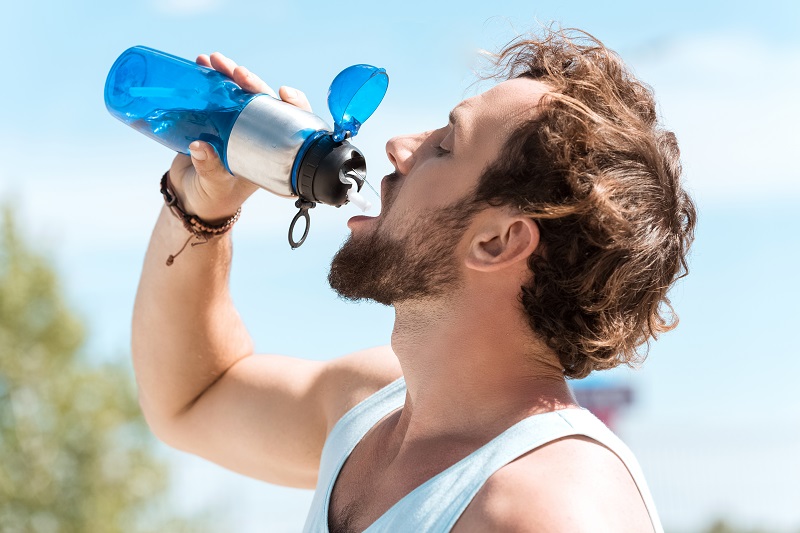Can You Drink Too Much Water? (How Much Is Too Much?!)

‘Stay hydrated!’
This is probably one of the most popular pieces of advice anyone can get. Whether it’s your doctor, personal trainer or nutritionist, every expert insists on the importance of drinking enough water daily – even if you’re not that thirsty!
With that in mind, it seems almost ridiculous that plain water can harm our physical health in any way. Well, here’s some surprising news: there is such thing as overhydration.
In fact, this is a medical diagnosis that can even affect vital organs and functions throughout the body if not managed properly. Luckily, though, the chances for developing this condition are fairly low as only some groups of people are at risk for it.
Since I first heard about overhydration, I just had to know how it manifests, what are the risks and how you can know if you’re secretly dealing with it.
If you’re as curious as I am, let’s dive in and explore this strange medical diagnosis today.
What is overhydration?
To put things simply, it is exactly what it sounds like: drinking more water than your body really needs.
As we already know, water is crucial for every major system of your body to work properly. Among other functions, drinking water allows your body to:
- Regulate bowel movements
- Regulate its internal temperature
- Digest foods properly
- Eliminate toxins and other waste products
- Perform every major bodily function
Most people are usually prone to drinking less water than they actually need; some may not acknowledge its importance, while others might not even realize how thirsty they really are.
However, drinking too much water is also a possibility.
Overhydration puts you at risk for water intoxication. This condition causes salt and other essential electrolytes in your body to become excessively diluted. One of the worst consequences can be hyponatremia, an illness where your sodium (salt) levels are dangerously low.
Additionally, if the levels of electrolytes in your system drops too low and too quickly, it can literally be fatal. While it is extremely rare, overhydration can sometimes be fatal.
Main types of overhydration
So far, researchers established that there are two major types of overhydration:
Increased water intake
This type involves drinking more water than your kidneys can remove through urine. When this happens, the water levels in your bloodstream can increase to dangerous levels.
Water retention
Much like the first type of overhydration, this condition occurs when your body cannot eliminate the excess of water correctly. Water retention can also come as a symptom for an underlying illness, such as cirrhosis, severe protein deficiency or vein damage in your legs.
Both types of overhydration can be dangerous because they create an imbalance in water and sodium levels in your blood.

What causes overhydration?
Your body is designed to process, use and eliminate a certain amount of water. If you drink more water than your body needs, the kidneys can’t eliminate it efficiently enough. The main negative impact is a dilution of important nutrients and substances in your blood.
According to the Institute of Medicine, a healthy adult should ideally drink 78-100 ounces (9-13 cups) of fluids per day.
Note that there are many variables to determine how much water one really needs. Factors such as age, weather, activity level, other medical problems also have a major influence on your ideal hydration levels. For example, if you’re dealing with fever or you are exposed to extreme heat, your body eliminates fluids much more quickly than usual, so you need to drink considerably more water.
So how can you know how much water you really need?
Well, your urine is one of the best indicators. Pale yellow urine is the goal everyone should aim for. If you notice that your urine has a dark hue, it may be time to drink some water. When the urine is colorless, though, it might signal overhydration.
What are the symptoms?
It’s very hard to detect the first symptoms of overhydration because they are usually very subtle. However, if the condition worsens, you may experience:
- Headaches
- Unexplainable confusion and disorientation
- Nausea and/or vomiting
Leaving overhydration untreated can cause a dangerous, sudden drop in sodium levels. At this stage, you might also experience:
- Spasms, cramps or muscle weakness
- Unconsciousness
- Seizures
- Coma
![]() ATTENTION! In rare, severe cases, overhydration may be fatal. This is precisely why no one should overlook this possibility and ask for medical help as soon as possible.
ATTENTION! In rare, severe cases, overhydration may be fatal. This is precisely why no one should overlook this possibility and ask for medical help as soon as possible.
Who is at risk for overhydration?
Overhydration is most often encountered in professional athletes as they usually drink plenty of water before or during an exercise. It’s mostly been reported in:
- Athletes who run races for more than 26.2 miles (marathons and ultramarathons)
- Ironman thriathletes
- Rugby players
- Military members involved in extreme training sessions
- Endurance cyclists
- Professional hikers
However, overhydration may also occur in people suffering from advanced forms of kidney and liver disease, since these organs are responsible for filtering and eliminating fluids. Sometimes, the disease may also affect those with heart failure.
Diagnosis
Firstly, a specialist will check your medical history to determine whether you are indeed suffering from hydration or another condition; this step is also crucial to find out if overhydration is cause by an underlying illness, so you can get proper treatment.
Depending on the severity of the condition, your doctor may also order blood and urine tests to check nutrient levels.
Treatment & prevention
Treating overhydration highly depends on the stage of your condition and what caused it in the first place. Common treatments may be:
- Reducing fluid intake
- Taking diuretics, a range of medication that increases production of urine
- Replacing sodium (only in severe cases)
- Treating the underlying condition that causes overhydration (if necessary)
Of course, the easiest way of preventing overhydration is by paying close attention to your water intake. For professional athletes, a good method is to weigh themselves before and after a race; such data allows them to calculate how much water they have lost and should replenish.
Ideally, one should consume 16-20 ounces of fluid for every pound lost.
If you’re exercising, it’s generally recommended to drink up to 4 cups of fluid every hour. Of course, this highly depends on the type of exercise you perform (for example, cardio may consume more fluids than lifting weighs).
If your fitness sessions are longer than one hour, you might also consider sport beverages. This type of drink provides you with sodium, potassium and other electrolytes you usually lose through sweat.
However, if overhydration is caused by a disease like kidney disease, diabetes or chronic heart failure, your doctor may suggest a more complex treatment plan that includes medication.
![]() How much water are you drinking daily? Share your hydration habits in the comment section and let’s keep each other healthy!
How much water are you drinking daily? Share your hydration habits in the comment section and let’s keep each other healthy!


